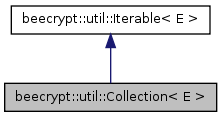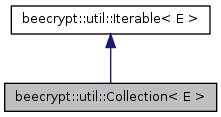beecrypt::util::Collection< E > Class Template Reference
[C++ classes mimicking java.util]
#include <Collection.h>


Public Member Functions | |
| virtual | ~Collection () |
| virtual bool | add (E *e)=0 |
| virtual bool | addAll (const Collection< E > &c)=0 |
| virtual void | clear ()=0 |
| virtual bool | contains (const E *e) const =0 |
| virtual bool | containsAll (const Collection< E > &c) const =0 |
| virtual bool | equals (const Object *obj) const =0 throw () |
| virtual jint | hashCode () const =0 throw () |
| virtual bool | isEmpty () const =0 throw () |
| virtual Iterator< E > * | iterator ()=0 |
| virtual Iterator< E > * | iterator () const =0 |
| virtual bool | remove (const E *e)=0 |
| virtual bool | removeAll (const Collection< E > &c)=0 |
| virtual bool | retainAll (const Collection< E > &c)=0 |
| virtual jint | size () const =0 throw () |
| virtual array< E * > | toArray () const =0 |
Detailed Description
template<class E>
class beecrypt::util::Collection< E >
- Note:
- In deviation from the Java API, the add(), contains() and remove() methods take the template parameter class E as parameter rather than Object.
From the OO point-of-view it makes much more sense that a collection of E should only accept elements of class E as parameters.
- Warning:
- If you do not use a parameter that is a subclass of Object (e.g. an interface), then you must guarantee that it has a method which matches Object::equals().
Constructor & Destructor Documentation
| virtual beecrypt::util::Collection< E >::~Collection | ( | ) | [inline, virtual] |
Member Function Documentation
| virtual bool beecrypt::util::Collection< E >::add | ( | E * | e | ) | [pure virtual] |
Implemented in beecrypt::util::AbstractCollection< E >, beecrypt::util::AbstractList< E >, beecrypt::util::ArrayList< E >, beecrypt::util::AbstractCollection< V >, beecrypt::util::AbstractCollection< E >, beecrypt::util::AbstractCollection< class Map< K, V >::Entry >, beecrypt::util::AbstractCollection< Provider >, beecrypt::util::AbstractCollection< K >, beecrypt::util::AbstractList< E >, beecrypt::util::AbstractList< Provider >, and beecrypt::util::ArrayList< Provider >.
| virtual bool beecrypt::util::Collection< E >::addAll | ( | const Collection< E > & | c | ) | [pure virtual] |
Implemented in beecrypt::util::AbstractCollection< E >, beecrypt::util::ArrayList< E >, beecrypt::util::AbstractCollection< V >, beecrypt::util::AbstractCollection< E >, beecrypt::util::AbstractCollection< class Map< K, V >::Entry >, beecrypt::util::AbstractCollection< Provider >, beecrypt::util::AbstractCollection< K >, and beecrypt::util::ArrayList< Provider >.
| virtual void beecrypt::util::Collection< E >::clear | ( | ) | [pure virtual] |
Implemented in beecrypt::util::AbstractCollection< E >, beecrypt::util::AbstractList< E >, beecrypt::util::ArrayList< E >, beecrypt::util::AbstractCollection< V >, beecrypt::util::AbstractCollection< E >, beecrypt::util::AbstractCollection< class Map< K, V >::Entry >, beecrypt::util::AbstractCollection< Provider >, beecrypt::util::AbstractCollection< K >, beecrypt::util::AbstractList< E >, beecrypt::util::AbstractList< Provider >, and beecrypt::util::ArrayList< Provider >.
Referenced by beecrypt::util::AbstractMap< K, V >::clear().
| virtual bool beecrypt::util::Collection< E >::contains | ( | const E * | e | ) | const [pure virtual] |
Implemented in beecrypt::util::AbstractCollection< E >, beecrypt::util::ArrayList< E >, beecrypt::util::AbstractCollection< V >, beecrypt::util::AbstractCollection< E >, beecrypt::util::AbstractCollection< class Map< K, V >::Entry >, beecrypt::util::AbstractCollection< Provider >, beecrypt::util::AbstractCollection< K >, and beecrypt::util::ArrayList< Provider >.
Referenced by beecrypt::util::AbstractSet< K >::removeAll(), beecrypt::util::AbstractCollection< K >::removeAll(), and beecrypt::util::AbstractCollection< K >::retainAll().
| virtual bool beecrypt::util::Collection< E >::containsAll | ( | const Collection< E > & | c | ) | const [pure virtual] |
| virtual bool beecrypt::util::Collection< E >::equals | ( | const Object * | obj | ) | const throw () [pure virtual] |
Implemented in beecrypt::util::AbstractCollection< V >, beecrypt::util::AbstractCollection< E >, beecrypt::util::AbstractCollection< class Map< K, V >::Entry >, beecrypt::util::AbstractCollection< Provider >, beecrypt::util::AbstractCollection< K >, beecrypt::util::AbstractList< E >, beecrypt::util::AbstractList< Provider >, beecrypt::util::AbstractSet< class Map< K, V >::Entry >, and beecrypt::util::AbstractSet< K >.
| virtual jint beecrypt::util::Collection< E >::hashCode | ( | ) | const throw () [pure virtual] |
Implemented in beecrypt::util::AbstractCollection< E >, beecrypt::util::AbstractList< E >, beecrypt::util::AbstractSet< E >, beecrypt::util::AbstractCollection< V >, beecrypt::util::AbstractCollection< E >, beecrypt::util::AbstractCollection< class Map< K, V >::Entry >, beecrypt::util::AbstractCollection< Provider >, beecrypt::util::AbstractCollection< K >, beecrypt::util::AbstractList< E >, beecrypt::util::AbstractList< Provider >, beecrypt::util::AbstractSet< class Map< K, V >::Entry >, and beecrypt::util::AbstractSet< K >.
| virtual bool beecrypt::util::Collection< E >::isEmpty | ( | ) | const throw () [pure virtual] |
Implemented in beecrypt::util::AbstractCollection< E >, beecrypt::util::ArrayList< E >, beecrypt::util::AbstractCollection< V >, beecrypt::util::AbstractCollection< E >, beecrypt::util::AbstractCollection< class Map< K, V >::Entry >, beecrypt::util::AbstractCollection< Provider >, beecrypt::util::AbstractCollection< K >, and beecrypt::util::ArrayList< Provider >.
| virtual Iterator<E>* beecrypt::util::Collection< E >::iterator | ( | ) | const [pure virtual] |
Implements beecrypt::util::Iterable< E >.
Implemented in beecrypt::util::AbstractCollection< E >, beecrypt::util::AbstractList< E >, beecrypt::util::AbstractSet< E >, beecrypt::util::AbstractCollection< V >, beecrypt::util::AbstractCollection< E >, beecrypt::util::AbstractCollection< class Map< K, V >::Entry >, beecrypt::util::AbstractCollection< Provider >, beecrypt::util::AbstractCollection< K >, beecrypt::util::AbstractList< E >, beecrypt::util::AbstractList< Provider >, beecrypt::util::AbstractSet< class Map< K, V >::Entry >, and beecrypt::util::AbstractSet< K >.
| virtual Iterator<E>* beecrypt::util::Collection< E >::iterator | ( | ) | [pure virtual] |
Implements beecrypt::util::Iterable< E >.
Implemented in beecrypt::util::AbstractCollection< E >, beecrypt::util::AbstractList< E >, beecrypt::util::AbstractSet< E >, beecrypt::util::AbstractCollection< V >, beecrypt::util::AbstractCollection< E >, beecrypt::util::AbstractCollection< class Map< K, V >::Entry >, beecrypt::util::AbstractCollection< Provider >, beecrypt::util::AbstractCollection< K >, beecrypt::util::AbstractList< E >, beecrypt::util::AbstractList< Provider >, beecrypt::util::AbstractSet< class Map< K, V >::Entry >, and beecrypt::util::AbstractSet< K >.
Referenced by beecrypt::util::ArrayList< Provider >::addAll(), beecrypt::util::AbstractList< Provider >::addAll(), beecrypt::util::AbstractCollection< K >::containsAll(), beecrypt::util::AbstractMap< K, V >::containsKey(), beecrypt::util::AbstractMap< K, V >::containsValue(), beecrypt::util::AbstractMap< K, V >::equals(), beecrypt::util::AbstractMap< K, V >::get(), beecrypt::util::AbstractMap< K, V >::hashCode(), beecrypt::util::AbstractMap< K, V >::remove(), beecrypt::util::AbstractSet< K >::removeAll(), beecrypt::util::AbstractCollection< K >::retainAll(), and beecrypt::util::AbstractMap< K, V >::toString().
| virtual bool beecrypt::util::Collection< E >::remove | ( | const E * | e | ) | [pure virtual] |
Implemented in beecrypt::util::AbstractCollection< E >, beecrypt::util::ArrayList< E >, beecrypt::util::AbstractCollection< V >, beecrypt::util::AbstractCollection< E >, beecrypt::util::AbstractCollection< class Map< K, V >::Entry >, beecrypt::util::AbstractCollection< Provider >, beecrypt::util::AbstractCollection< K >, and beecrypt::util::ArrayList< Provider >.
| virtual bool beecrypt::util::Collection< E >::removeAll | ( | const Collection< E > & | c | ) | [pure virtual] |
Implemented in beecrypt::util::AbstractCollection< E >, beecrypt::util::AbstractSet< E >, beecrypt::util::AbstractCollection< V >, beecrypt::util::AbstractCollection< E >, beecrypt::util::AbstractCollection< class Map< K, V >::Entry >, beecrypt::util::AbstractCollection< Provider >, beecrypt::util::AbstractCollection< K >, beecrypt::util::AbstractSet< class Map< K, V >::Entry >, and beecrypt::util::AbstractSet< K >.
| virtual bool beecrypt::util::Collection< E >::retainAll | ( | const Collection< E > & | c | ) | [pure virtual] |
| virtual jint beecrypt::util::Collection< E >::size | ( | ) | const throw () [pure virtual] |
Implemented in beecrypt::util::AbstractCollection< E >, beecrypt::util::AbstractList< E >, beecrypt::util::AbstractSet< E >, beecrypt::util::ArrayList< E >, beecrypt::util::AbstractCollection< V >, beecrypt::util::AbstractCollection< E >, beecrypt::util::AbstractCollection< class Map< K, V >::Entry >, beecrypt::util::AbstractCollection< Provider >, beecrypt::util::AbstractCollection< K >, beecrypt::util::AbstractList< E >, beecrypt::util::AbstractList< Provider >, beecrypt::util::AbstractSet< class Map< K, V >::Entry >, beecrypt::util::AbstractSet< K >, and beecrypt::util::ArrayList< Provider >.
Referenced by beecrypt::util::ArrayList< Provider >::addAll(), beecrypt::util::AbstractList< Provider >::addAll(), beecrypt::util::AbstractCollection< K >::addAll(), beecrypt::util::AbstractCollection< K >::containsAll(), beecrypt::util::AbstractSet< K >::equals(), beecrypt::util::AbstractMap< K, V >::isEmpty(), beecrypt::util::AbstractSet< K >::removeAll(), beecrypt::util::AbstractCollection< K >::retainAll(), and beecrypt::util::AbstractMap< K, V >::size().
| virtual array<E*> beecrypt::util::Collection< E >::toArray | ( | ) | const [pure virtual] |
Implemented in beecrypt::util::AbstractCollection< E >, beecrypt::util::ArrayList< E >, beecrypt::util::AbstractCollection< V >, beecrypt::util::AbstractCollection< E >, beecrypt::util::AbstractCollection< class Map< K, V >::Entry >, beecrypt::util::AbstractCollection< Provider >, beecrypt::util::AbstractCollection< K >, and beecrypt::util::ArrayList< Provider >.
The documentation for this class was generated from the following file:
- include/beecrypt/c++/util/Collection.h
 1.5.8
1.5.8